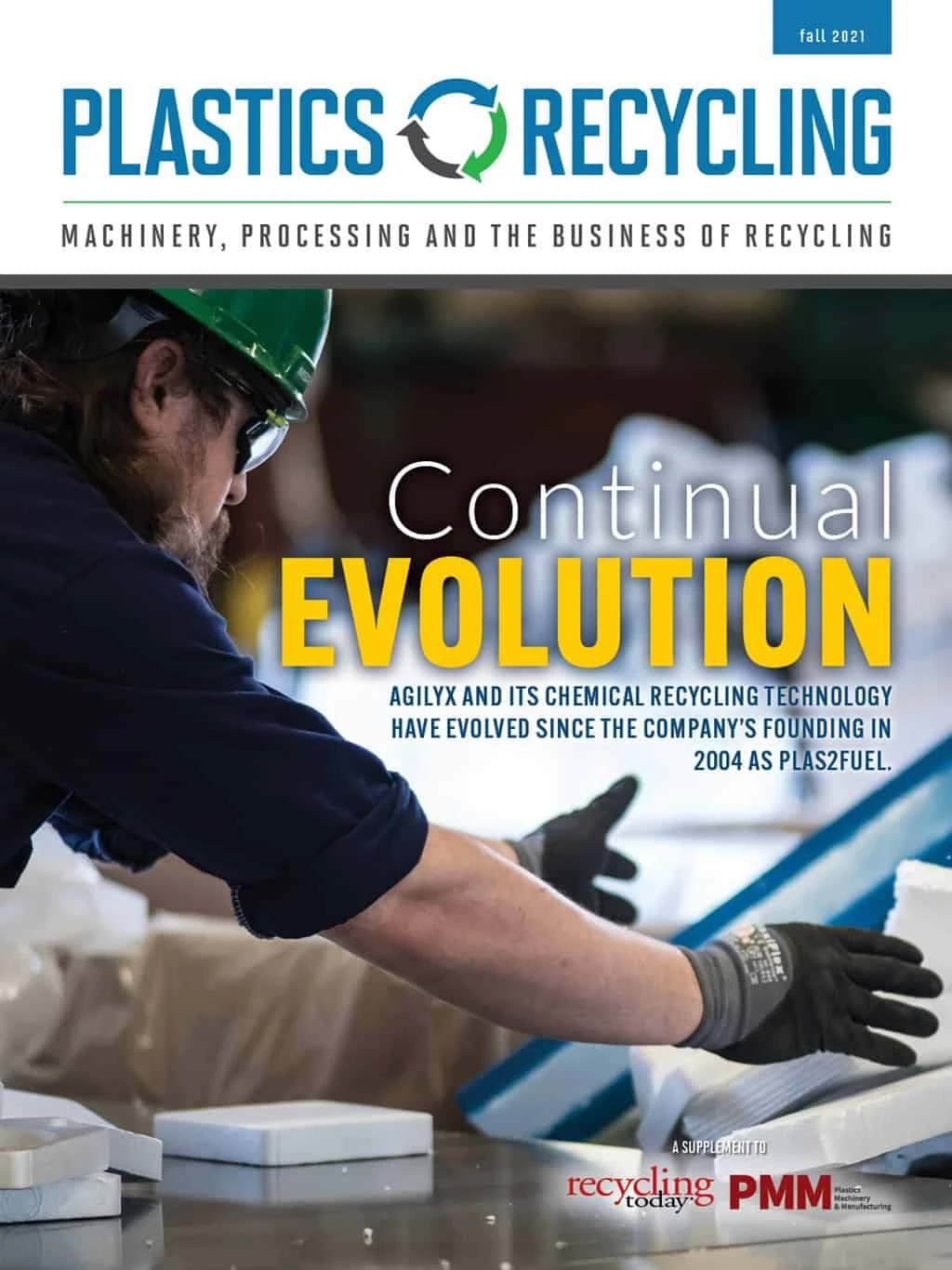With nearly 30 years in the plastics industry under his belt, Adrian Merrington has witnessed a shift from a focus on mechanical recycling to a mindset that takes products’ entire life cycles into account. Merrington serves as business quality leader for engineered materials, compounds and blends at Trinseo LLC, a global supplier of plastics, latex binders and synthetic rubber that has a portfolio of resins made with recycled content.
Recognized for his passion for education and research in plastics recycling and sustainability, he served as technical chairman of the Recycling Division of the Society of Plastics Engineers (SPE), Danbury, Connecticut, until earlier this year and is a 2021 recipient of SPE’s Honored Service Members Award. He has been involved with SPE for 27 years.
What do you see on the horizon that’s exciting for plastics recycling and sustainability? I think the next big thing is where the business is moving. Most traditional recyclers up until recently were mechanical recyclers focused on primary and secondary recycling processes: recover plastic, grind it up and reuse it in either the same part (primary) or in parts with less demanding property requirements (secondary).
The shortcoming of these types of processes is that the plastics undergo degradation, e.g., chain scission during processing of thermoplastics.
That means they can generally only be used as a percentage of the recycled content and reused a limited number of times before properties are no longer maintained. Some plastics are more susceptible to chain scission, so the ability to recycle cycle after cycle is diminished.
The influx of interest from large plastics companies in sustainability has stimulated focus in tertiary recycling opportunities where plastic waste is used as the feedstock in processes that generate chemicals, such as monomers or oligomers, or fuel. These chemical building blocks recovered by such techniques are used to produce recycled-content plastics with virgin-equivalent properties not typically achievable in primary and secondary recycling processes.
By generating monomers or oligomers, these tertiary recycling processes are not susceptible to the decreasing properties exhibited by mechanically generated recycled-content plastics. Enabling a cycle-after-cycle product that maintains properties is the only way to ensure a circular economy for plastics.
What role do resin suppliers play in increasing recycling? I think that many of the big names in resin supply are accepting the opportunity to ensure plastics’ sustainability. Twenty years ago, I sat in the offices at a major resin supplier who told me that they didn’t see value in recycling plastics, as anything that was recycled meant they couldn’t sell new product in its place.
Sponsored Content
Labor that Works
With 25 years of experience, Leadpoint delivers cost-effective workforce solutions tailored to your needs. We handle the recruiting, hiring, training, and onboarding to deliver stable, productive, and safety-focused teams. Our commitment to safety and quality ensures peace of mind with a reliable workforce that helps you achieve your goals.
Whether pushed or pulled into acceptance, there is a significant movement toward sustainability from resin suppliers. Some of the biggest name brands no longer accept low bids as the only reason to buy plastics from a producer and are demanding sustainable production.
What are the biggest challenges that are holding plastics recycling back? Infrastructure and legislature. If we want to see plastics recycled, there has to be a means by which they are recovered and available in the locations where the recyclers exist.
Is there anything else you would like to share? If your business involves plastics or plastics recycling, it’s not enough to sit on the sidelines anymore. There are too many voices that are increasing in volume that offer counterarguments to the existence of your business. Join a group like SPE that continues to do an excellent job providing science-based arguments against emotive-driven opinions.
Get curated news on YOUR industry.
Enter your email to receive our newsletters.

Explore the Fall 2021 Plastics Recycling Issue
Check out more from this issue and find your next story to read.
Latest from Recycling Today
- AF&PA report shows decrease in packaging paper shipments
- GreenMantra names new CEO
- Agilyx says Styrenyx technology reduces carbon footprint in styrene production
- SABIC’s Trucircle PE used for greenhouse roofing
- Hydro to add wire rod casthouse in Norway
- Hindalco to invest in copper, aluminum business in India
- Recycled steel price crosses $500 per ton threshold
- Smithers report looks at PCR plastic’s near-term prospects







